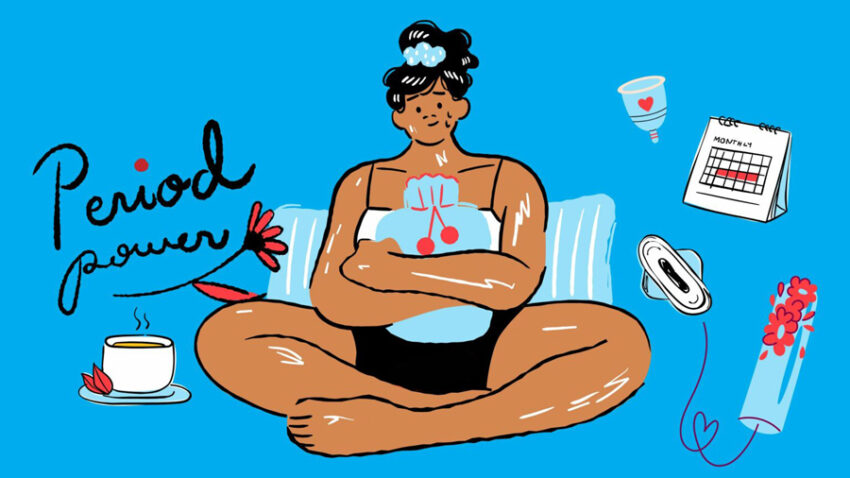Let’s be real — growing up in Malaysia, talking about periods out loud still feels like you’re breaking some unspoken rule. Whether it’s hiding pads between your books like a secret agent on a mission, or awkwardly asking your female friend to check if you’ve leaked through your clothes, the cultural stigma around menstruation is real. And because we don’t talk about it enough, a lot of us grow up believing weird things about periods that just aren’t true.
Take this for example — a friend once told me she avoided swimming while on her period because she was afraid she was going to “pollute” the water. Another friend thought she couldn’t use a menstrual cup because it would “take her virginity”. These aren’t just harmless tales — these period myths can seriously affect our confidence, how we take care of ourselves, and even our access to proper hygiene products.
So let’s talk about it. Here are four common period myths we need to throw in the trash once and for all:
Myth #1: Periods are dirty

This one is probably the most common — the idea that period blood is “dirty” or impure. Let’s set the record straight: period blood is just like any other blood that comes from your body. It’s made up of blood, tissue from the uterine lining, and mucus. That’s it. Nothing gross or shameful about it.
But because of this period myth, many people are told not to enter places of worship, cook food, or even participate in their own traditional festivities (yes, really). Some are even made to sleep separately from their families during their period. These kinds of beliefs create shame around something that is completely natural and healthy.
Calling menstruation dirty only reinforces stigma and makes people feel like their bodies are something to be embarrassed about. It’s time we stop treating periods like a secret we need to hide.
Myth #2: Tampons or menstrual cups take away virginity

In more conservative communities, there’s this myth that using internal products like tampons or menstrual cups can “break your hymen” and somehow take away your virginity.
But here’s the truth: virginity is a social and cultural concept, not something you can lose from a piece of cotton or silicone. The hymen is a stretchy membrane that can wear away from everyday activities like biking, dancing, or even stretching. Some people aren’t even born with a noticeable hymen!
This period myth not only spreads misinformation, but it also restricts people from trying out products that could actually make managing their period easier, safer, and more comfortable. Everyone should have the freedom to choose what works best for them without being shamed or judged.
Myth #3: Period pain is normal, no need to treat it
Raise your hand if you’ve ever heard someone say, “Cramps are just part of being a girl.” While some discomfort can be normal, severe period pain is not something anyone should have to just put up with.
Conditions like endometriosis and polycystic ovary syndrome (PCOS) can cause intense pain, heavy bleeding, and even long-term health issues. But because of this period myth, many people delay getting medical help, thinking it’s just something they have to “tough out.”
Normalizing pain dismisses the lived experiences of menstruators and keeps them from getting the care they deserve. If your period pain is affecting your life — missing school, work, or just feeling miserable — it’s important to talk to a doctor. Your pain is real, and you deserve quality healthcare and treatment for it.
Myth #4: Periods are a sign of weakness

Have you ever heard someone say menstruating people are too “emotional” or “unstable” during their periods? This stereotype plays into the harmful narrative that periods make people irrational or less capable — whether at school, work, or anywhere else.
But let’s be honest: dealing with cramps, bloating, hormonal changes, and still showing up regardless? That’s not weakness — that’s serious resilience.
Associating periods with weakness just reinforces outdated gender stereotypes. It undermines people’s capabilities and contributes to inequality. Let’s move past this tired old thinking!
So, what can we do about it?

The first step to dismantling period myths is to create a culture where talking about periods is normal, not taboo. When we have open conversations about periods, it makes it easier for people to get the support, products, and healthcare they need.
It starts with us. Whether it’s correcting a friend who spreads period myths, sharing accurate info online, or simply being open about your own experiences, every conversation matters. We can also normalize good period hygiene practices without making them awkward or shameful.
At the end of the day, we all deserve to feel confident and informed about our bodies. So the next time you hear one of these period myths being passed around, don’t stay quiet, speak up. Because smashing stigma starts with everyday moments — and you have the power to make a difference.
READ >> Let’s Talk Periods: Ending Period Poverty in Malaysia




